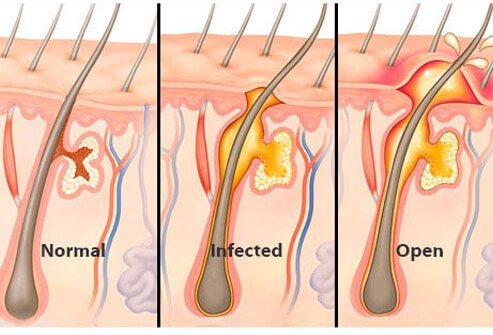A boil, medically known as a furuncle, is a painful, pus-filled bump that forms under the skin due to an infected hair follicle or oil gland.
Boils can appear anywhere on the body but are most common on areas prone to friction, such as the face, neck, armpits, buttocks, and thighs.

While often harmless, boils can be uncomfortable and, in some cases, indicate underlying health issues that require medical attention.
Causes of Boils
Boils usually occur when bacteria, most commonly Staphylococcus aureus, enter the skin through a cut or hair follicle.
This causes an infection, leading to redness, swelling, and pus formation. Factors that can increase the likelihood of developing boils include:
- Poor Hygiene: Infrequent washing can lead to clogged pores and bacterial buildup.
- Weakened Immune System: People with weakened immunity (due to diabetes, autoimmune conditions, or other health issues) are more prone to infections.
- Friction and Sweating: Tight clothing or excessive sweating can irritate the skin, increasing the risk of boils.
- Sharing Personal Items: Using towels, razors, or clothing that belong to someone with an active skin infection can spread bacteria.
Symptoms to Watch For
Boils often start as small, red bumps that gradually grow larger and more painful over a few days. Common symptoms include:
- A firm, swollen lump under the skin.
- Redness and warmth in the affected area.
- A central pus-filled “head” that may eventually rupture and drain.
- Tenderness and throbbing pain.
In severe cases, boils may be accompanied by fever, swollen lymph nodes, and fatigue, especially if the infection spreads beyond the initial area.
When to Seek Medical Attention
While small boils often heal on their own, you should consult a healthcare professional if:
- The boil is unusually large or extremely painful.
- It does not improve within 10 days.
- You experience recurrent boils.
- You develop a fever or signs of systemic infection (e.g., chills, rapid heart rate).
- The boil is located on your face, as infections near the eyes or brain can be serious.
Home Remedies and Treatment
For mild cases, at-home care can often speed up healing and provide relief. Here are some effective remedies:
- Warm Compress: Applying a warm, damp cloth to the affected area several times a day can help reduce pain and encourage the boil to drain.
- Keep It Clean: Wash the area with antibacterial soap and water to prevent the spread of infection.
- Avoid Popping the Boil: Squeezing or puncturing the boil can push the infection deeper into the skin and lead to complications.
- Use Antibiotic Ointments: Over-the-counter antibiotic creams may help reduce bacterial buildup on the skin’s surface.
- Pain Relief: Taking over-the-counter pain relievers, such as ibuprofen, can help ease discomfort.
Medical Treatment Options
If the boil doesn’t respond to home care or is causing severe symptoms, a doctor may recommend one of the following treatments:
- Incision and Drainage: This is a minor procedure where the doctor carefully drains the pus from the boil.
- Antibiotics: If the infection has spread or you have a compromised immune system, you may be prescribed oral antibiotics.
Preventing Boils
To reduce the risk of developing boils in the future, consider the following preventive measures:
- Maintain Good Hygiene: Wash your hands regularly, shower after sweating, and keep your skin clean and dry.
- Avoid Sharing Personal Items: This helps prevent the spread of bacteria that can cause boils.
- Wear Loose-Fitting Clothing: Tight clothing can cause friction and irritate the skin.
- Boost Your Immune System: Eating a balanced diet, staying hydrated, and getting regular exercise can strengthen your body’s defenses against infections.
- Treat Minor Skin Injuries Promptly: Even small cuts and scrapes should be cleaned and covered to prevent bacterial entry.
Complications of Untreated Boils
In most cases, boils resolve on their own or with minimal intervention. However, if left untreated, they can lead to complications such as:
- Carbuncles: A cluster of boils that merge to form a larger, deeper infection.
- Abscess Formation: A deep pocket of pus that may require surgical drainage.
- Sepsis: In rare cases, the infection can enter the bloodstream and cause life-threatening complications.
Final Thoughts
Boils are a common skin problem that can be painful and unpleasant but are usually treatable with proper care.
By following preventive measures and seeking medical attention when necessary, you can reduce your risk and keep your skin healthy.
If you’re dealing with recurrent or severe boils, it’s worth consulting a doctor to identify any underlying health issues that may be contributing to the problem.